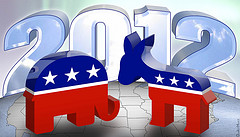Super Tweet-day: can social media predict election results?


On Tuesday, 10 different states will hold primary elections as the race for GOP presidential candidate heats up. Each of the four remaining candidates will look to social media as a key forum for last-minute campaigning. Can the same forum be used to measure whether it's paying off, and to to predict the outcome of the election before the official results are in?
Attensity, a firm that provides text analytics software to help give feedback on marketing campaigns, conducted a study for USA Today attempting to answer this question. They measured sentiment and support for each candidate by studying over 800,000 tweets sent in the past week. Based on this Twitter analysis, the firm projected that Mitt Romney would win in Massachusetts, Virginia, Idaho, Ohio, Oklahoma, Tennessee and North Dakota, Newt Gingrich would take Florida, Alaska would go to Ron Paul, and Santorum would walk away with Vermont.
Only time will tell how accurate these projections are, and as skeptics are quick to note, there are several issues with this method. As Forrester analyst Zach Hofer-Schall told USA Today, active members of social media are not necessarily representative of the population. Similarly, interest in and conversation about a candidate does not necessarily indicate support for him. Bernardo Huberman, director of the social computing lab at Hewlett-Packard, pointed out that Twitter can be easily manipulated through the use of automated tweeting.
That being said, political analysts are certainly intrigued by the extent to which the real time streaming data available from social media sites like Twitter and Facebook could have an ability to forecast the results. The science is certainly still in its early stages and lacks conclusive evidence surrounding it's reliability. But as candidates run technology-based campaigns with increasing frequency, the possibility for using those technologies to predict results may be increasing.
[via USA Today]
Related on SmartPlanet:
This post was originally published on Smartplanet.com